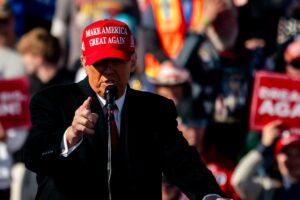The World Trade Organization (WTO) has found that tariffs on steel and aluminium imports that were imposed by the US under former President Donald Trump violate global trade rules.
Mr Trump had claimed national security concerns when he announced the new border taxes in 2018, sparking a wave of trade fights around the world.
The WTO rebuffed that argument, saying the duties did not come “at a time of war or other emergency”.
The US said it stood by the tariffs.
The US “strongly rejects” the ruling and has no intention of removing the measures, assistant US trade representative Adam Hodge said.
“The Biden administration is committed to preserving US national security by ensuring the long-term viability of our steel and aluminium industries,” he said, adding that the reports “only reinforce the need to fundamentally reform the WTO dispute settlement system”.
“The United States has held the clear and unequivocal position, for over 70 years, that issues of national security cannot be reviewed in WTO dispute settlement and the WTO has no authority to second guess the ability of a WTO member to respond to a wide range of threats to its security,” he said.
The cases were brought by China, Norway, Switzerland and Turkey.
Wider implications
The WTO said the US should bring its trade policy into compliance. If the country does not abide by the decision, the countries who brought the complaints are entitled, under WTO rules, to impose retaliatory tariffs on the US.
The US can also appeal. That would leave the dispute in limbo, because the US has for years blocked appointments to the WTO’s appellate body, which hears appeals, leaving it unable to function.
China said in a statement that it hoped the US would respect the ruling and correct its policies “as soon as possible”, while Switzerland’s secretariat for economic affairs said the WTO report had confirmed that countries enjoyed broad discretion to protect security interests “provided they meet certain minimum requirements”.
Norway’s ministry of foreign affairs did not respond to a question about next steps. It said in a statement that it had brought the case to try “to prevent protectionism… so that the rules-based, multilateral trading system is not undermined”.
Trade experts said the dispute mattered less for its practical impact than for its implications for the increasingly shaky consensus around how to govern global trade.
“In today’s climate with ever-heightening geopolitical tensions, countries are increasingly likely to trigger the national security exception,” said Chad Bown, global trade expert at the Peterson Institute for International Economics (PIIE).
“This particular ruling thus has importance not only for members’ future policies but also how it impacts their overall support for the WTO system altogether.”
Mr Trump imposed the tariffs of 25% on steel and 10% on aluminium in 2018, citing unfair competition and national security interests.
The taxes, which have been supported by labour unions representing US steel workers, have already been eased significantly compared to what was first announced, in which even shipments from close allies in North America risked being affected.
Mr Trump signed deals with some countries exempting them from the tariffs or admitting their shipments up to a certain level.
The Biden administration reached similar agreements with the European Union, Japan and the UK as it tried to smooth relations with allies, but kept the tariffs in full for other countries.
Though the tariffs angered allies – and raised concern among US manufacturers that use metals about increased costs – the US said they were aimed primarily at China, which for years has faced concerns from other countries that it has been selling its steel abroad for below market prices thanks to unfair government support.
The office of the US trade representative this week sent a proposal to the European Union outlining a new plan to shape the global steel and aluminium market.
The aim is to promote trade in metals that are produced in ways that minimise carbon emissions and impose tariffs on metals that are deemed to cause too much pollution.
Whilst the details of how such a plan would work haven’t yet been published it is likely that China would face taxes in trying to sell metals to countries that sign up.
The trade war between the US and China, which was sparked in part by the metals tariffs, has had lasting effects on trade between the world’s two largest economies.
A high-profile 2020 trade agreement announced by Mr Trump and Chinese President Xi Jinping helped to reduce some of the public tension over the issue.
But nearly two-thirds of all the goods China sells to the US remain subject to extra taxes, as do roughly 58% of what the US sells to China, according to the PIIE.
Source : BBC















